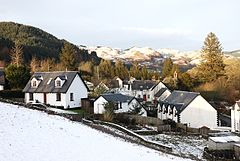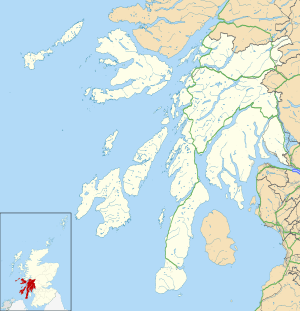Ford, Argyll
Ford (Scottish Gaelic: Àth na Crà) is a small village at the southern end of Loch Awe in Argyll, Scotland. The village originated as a stopping point on the drove route to Inveraray, but it eventually gained a church, school, blacksmith, and a village shop, the latter three of which are no longer open. The Ford Hotel dates back to 1864, and was probably erected on the site of the old change house. Today it is a guest house and is a listed building. The village has a smokery; the building burnt down on Christmas Eve 2008 and was rebuilt. At the start of Loch Awe, a great spot for a pike fishing or watching wildlife is An Lodan Bay, now more commonly referred to as Torran Bay, which has a hostel. Also to be built within the next year will be a new village shop, farm shop, bar restaurant and function room next to the hostel.
Ford
| |
|---|---|
 Ford in 2008 | |
 Ford Location within Argyll and Bute | |
| OS grid reference | NM868036 |
| Council area | |
| Lieutenancy area | |
| Country | Scotland |
| Sovereign state | United Kingdom |
| Post town | LOCHGILPHEAD |
| Postcode district | PA31 |
| Police | Scotland |
| Fire | Scottish |
| Ambulance | Scottish |
| UK Parliament | |
| Scottish Parliament | |
There are historic paddocks along the side of the ford to Dalavich road. A hill known as Dun Dubh overlooks the village.
Prehistoric remains
Many prehistoric structures survive within the village boundary and are all easily accessible or can be seen from the public road. Opposite the guest house, in the village centre, stands a prehistoric burial mound known in Gaelic as Cnoc an Ath (hillock of the ford). Several standing stones are scattered around the area, the three most notable ones being the one in the field next to the guest house, the one opposite Glennan Farm, and the largest one at Torran Farm. A crannog is also present in Loch Ederline and is clearly visible from the road.
Bibliography
- John B. Stephenson - Ford, a Village in the West Highlands of Scotland, [1984, Paul Harris Publishing, Edinburgh], ISBN 0-86228-081-8
External links

- Ford Community Project.
- The website of the Ford House guest house has photos of the area and a nice picture of the old Ford Hotel.